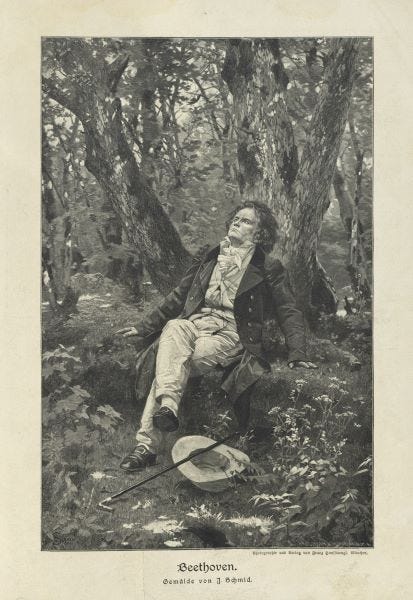What do the books on your shelf say about you? Thanks to the dedication and hard-work of the Beethoven-Haus Bonn, we know a fair amount about Beethoven’s taste in literature. Amongst the list of fine literature, non-fiction, and reference books, we can find a hidden gem: a spiritual text, containing one essay for every day of the year. This book is full of Beethoven’s annotations, providing us with a precious insight into what moved or inspired the great composer, and perhaps gave expression to his philosophical and spiritual beliefs at the time.
The author and title of this treasure:
Christoph Christian Sturm's Reflections on the Works of God in the Realm of Nature and Providence for Every Day of the Year
Whether or not you have spiritual or religious beliefs of your own, it is likely you would find this book beautifully uplifting and motivating. Reading Sturm’s poetic and passionate lines, one cannot help but marvel at and feel deeply grateful for the incredible variety and splendor of the natural world.
An excerpt from today’s essay (May 30th):
In these beautiful days of spring, let us excite our souls at the sight of so many vegetables which cover the earth, to glorify the power and goodness of our Creator. Wherever we go, we walk on plants and flowers; and as far as we can extend our view, we discover fields and meadows covered with the rich blessings of heaven. If each spire of grass were capable of praising its Author, how many reiterated millions of hymns should arise to Him out of even the narrow compass of one meadow! But O ye beautiful productions of the vegetable kingdom, ye have no need of language; your inimitable dress, your immense number, and the advantages which ye afford the earth, sufficiently proclaim the goodness of the Creator: and your appearance is sufficient to induce us to approach him with heart and voice. Yes, even by you I feel myself drawn to present a sacrifice of thanksgiving to our common Creator. Lovely creatures, continue to flourish! I shall often contemplate your excellencies: and I hope never to do it without a sense of gratitude to My God.
How’s that for a morning meditation?
The book contains a great deal of science that is up to date at the time of publication. An example from the same essay:
More than 20,000 different plants have already been found out and new ones are daily discovered. By the assistance of the microscope, some have been found, where they were least to be expected. Mosses and sponges have been classed among vegetables, and have presented to the naturalist, seeds and flowers before unknown.
In part 1 of this series, we would like to turn our attention to the author of this collection of inspirational essays. Subsequent articles will take a closer look at Beethoven’s annotations and what we can learn from them.
Christoph Christian Sturm (1740-1786)
Sturm was born in 1740, thirty years Beethoven’s senior. The German preacher and author was known for his warmth and kindness. He preached the love of Christ, and had a strong belief in religious tolerance. His grandfather was a scientist and mathematician, and his father was a lawyer. Science was a family interest, and Sturm’s high level of education is evident in Reflections on the Works of God in the Realm of Nature. Also evident from Sturm’s writings is his great love of nature. The essays encourage the reader to look for God in nature. The topics he touches upon range from the importance of bees to marveling at celestial bodies and the vastness of the universe!
Sturm left a legacy of 37 books covering various religious subject areas. These include Biblical history, song books, many publications for children, and two collections of daily essays. The latter proved to be his most popular two books.
Was Beethoven’s Tempest sonata inspired by Sturm’s writings?
When Beethoven’s secretary, Anton Schindler, asked Beethoven how the Tempest sonata should be interpreted, Beethoven reportedly told his secretary to read (Shakespeare’s) The Tempest in order to understand the piece. Tempest is another word for storm, in the German: sturm. Could Beethoven have been referring to Sturm’s Reflections when Schindler asked about this dramatic and hypnotic piece of music?
Follow the link to learn more about this much loved sonata:
Interesting facts about Beethoven’s Tempest
(Image from the Beethoven-Haus Bonn digital archives)
Beethoven made 117 notations in 72 essays in Reflections on the Works of God in the Realm of Nature. A detailed study of these annotations was made by the late Charles C. Witcombe of San Jose State University in California. His master’s thesis is a tremendous effort and a fascinating read. It is a unique window into Beethoven’s thinking and his faith; it can be viewed as a reflection of his religious beliefs at the time.
Keep an eye out for Part 2, where we will delve deeper and examine the contents and meaning of Beethoven’s annotated copy of Reflections on the Works of God in the Realm of Nature!
(Sturm’s full publication is available to read online on the Library of Congress website.)
Recommended articles
Interesting facts about Beethoven’s Tempest





